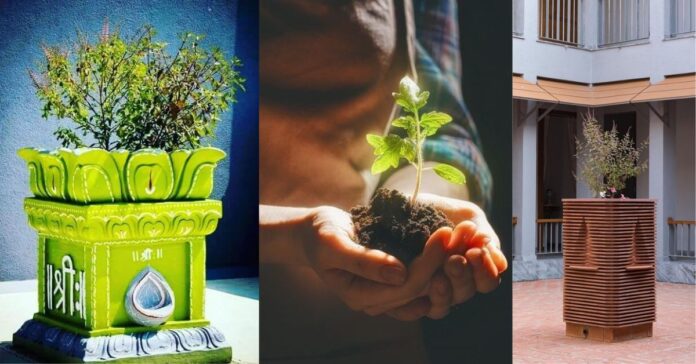Introduction:
Tulsi, also known as Holy Basil (*Ocimum tenuiflorum* or *Ocimum sanctum*), is a revered plant celebrated for its medicinal, practical, and religious significance. Commonly referred to as Tulasi, it plays a crucial role in traditional medicine, particularly Ayurveda, due to its adaptogenic, antioxidant, anti-inflammatory, and antimicrobial properties. Tulsi is often grown in homes not only for its health benefits but also for its ability to purify the air and repel insects. Its religious importance in Hinduism, where it is considered a sacred plant, adds to its esteemed status, making it a symbol of health, prosperity, and spiritual well-being.
Scientific Name: Ocimum tenuiflorum* (also known as Ocimum sanctum*)
Common Names: Holy Basil, Tulasi
Tulsi’s Fame:

Source: Pinterest
Tulsi is famous for its significant role in traditional medicine, particularly in Ayurveda. It is revered for its holistic healing properties and is commonly used in herbal remedies, teas, and dietary supplements.
Medicinal Uses of Tulsi:

Source: Pinterest
Tulsi is renowned for its numerous medicinal properties, including:
1. Adaptogenic Properties:
It helps the body adapt to stress and promotes mental balance.
2. Antioxidant:
protects cells from damage caused by free radicals.
3. Anti-inflammatory:
reduces inflammation and associated pain.
4. Antimicrobial:
Fights bacteria, viruses, and fungi.
5. Immunomodulatory:
enhances and regulates the immune system.
6. Cardioprotective:
supports heart health by lowering cholesterol and blood pressure.
7. Anti-diabetic:
helps regulate blood sugar levels.
8. Gastrointestinal Benefits:
Eases digestive issues like indigestion, bloating, and ulcers.
9. Respiratory Benefits:
It relieves conditions like asthma, bronchitis, and colds.
10. Skin Health:
It helps with acne, eczema, and other skin disorders.
Benefits of Tulsi:

Source: Pinterest
Stress Relief:
Reduces anxiety and stress.
Improves Immunity:
Strengthens the immune system.
Detoxification:
purifies the blood and flushes out toxins.
Respiratory Health:
Alleviates respiratory disorders.
Digestive Health:
Enhances digestion and prevents gastrointestinal issues.
Heart Health:
Supports cardiovascular health.
Blood Sugar Control:
It helps maintain healthy blood sugar levels.
Skin and hair:
Improves skin health and promotes hair growth.
Side Effects of Tulsi:

Source: Pinterest
While tulsi is generally safe for most people, some potential side effects include:
Blood Thinning:
Can act as a natural blood thinner, which may be problematic for those on anticoagulant medications.
Hypoglycemia:
may lower blood sugar levels excessively if taken with anti-diabetic medication.
Fertility Concerns:
Some studies suggest it might affect fertility.
Allergic Reactions:
In rare cases, it can cause allergic reactions like itching, swelling, or difficulty breathing.
Interaction with Medicines:
Can interact with certain medications like blood thinners, anti-diabetics, and others.
Tulsi in Homes:

Source: Pinterest
Tulsi is often grown in homes due to its numerous benefits:
Air Purifier:
It helps purify the air by releasing oxygen and absorbing harmful gases.
Natural Insect Repellent:
Keeps mosquitoes and other insects at bay.
Aromatic Plant:
This plant releases a pleasant fragrance that can refresh the home environment.
Medicinal Plant:
Provides easy access to its leaves for various home remedies.
Also read: Transform Your Living Space with These Unique House Plants
Why is Tulsi placed outside the house?

Source: Pinterest
Tulsi is placed outside the house because it requires sufficient sunlight for healthy growth. Additionally, it creates positive energy around the house and keeps negative energies at bay. According to Vastu experts, keeping Tulsi on the terrace is not recommended as it can lead to financial loss.
Religious Importance of Tulsi:

Source: Pinterest
Tulsi holds immense religious significance, especially in Hinduism.
Sacred Plant:
Considered an earthly manifestation of the goddess Tulsi/Vrinda, a consort of Lord Vishnu.
Rituals and Worship:
integral part of daily worship rituals in many Hindu households and temples.
Protective Symbol:
Believed to protect the home from evil and bring prosperity and well-being.
Holy Basil:
Often used in religious ceremonies, prayers, and as an offering to deities.
Vastu Benefits of Tulsi Plants at Home:

Source: Pinterest
Positive Energy:
Tulsi is believed to attract positive energy and dispel negativity from the home.
Health and Well-Being:
It promotes the health and well-being of the household members by purifying the air and reducing stress.
Financial Prosperity:
Tulsi is associated with prosperity and financial stability, enhancing the household’s overall wealth.
Harmony:
It fosters peace and harmony within the family, improving relationships.
Location:
According to Vastu, placing the Tulsi plant in the north, north-east, or east direction of the house is considered auspicious.
Also read: 12 Vastu Plants to Energize Your Home and Bring Positive Energy
Conclusion:
In summary, tulsi is a plant with profound medicinal, practical, and religious significance, revered for its healing properties, cultural importance, and role in promoting well-being and spirituality.
Frequenlty Asked Questions:
A: Tulsi offers numerous health benefits, including stress relief, improved immunity, respiratory and digestive health support, heart health, and blood sugar control. It also has antibacterial, anti-inflammatory, and antioxidant qualities.
A: You can incorporate Tulsi into your daily routine by consuming Tulsi tea, adding Tulsi leaves to your meals, or using Tulsi-based supplements. Growing a Tulsi plant at home also provides easy access to fresh leaves for various uses.
A: While Tulsi is generally safe, it might interact with certain medications, such as blood thinners and anti-diabetics. Pregnant and breastfeeding women should consult with a healthcare provider before consuming Tulsi.
A: Hindus consider Tulsi a sacred plant and the earthly form of the goddess Tulsi/Vrinda. They often use it in rituals and worship, believing it brings prosperity, well-being, and protection.
A: Tulsi plants thrive in bright, indirect sunlight and well-draining soil. They require regular watering but avoid overwatering. Place the plants outdoors to receive adequate sunlight and bring them indoors during colder months.
“Stay updated with the latest news and exclusive features by joining our company’s WhatsApp channel and downloading our app today!”
Suggested articles:
Vastu for North Facing Houses: Tips for Better home and living
Vastu Shastra for Home: Design Tips for Peace and Prosperity



